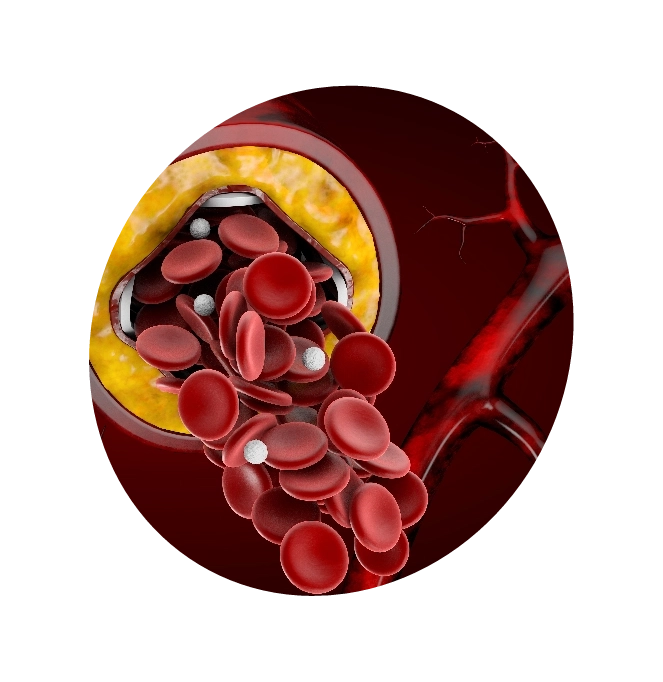What is Lipid Disorders?
Lipid Disorders are when there are too many fatty substances in the blood such as cholesterol and triglycerides, increasing the risk for heart disease and atherosclerosis.
Because of its reputation as a risk factor for heart disease, people tend to think of cholesterol only in negative terms. But cholesterol is an important component of cell membranes and is vital to the structure and function of all of your body’s cells. Cholesterol also is a building block in the formation of certain types of hormones.
Still, 37 million American adults have high blood cholesterol levels, and 105 million have cholesterol levels that are higher than desirable (hypercholesterolemia). If you’re one of these people with this largely preventable condition, you may be on your way to heart disease.
When the levels of cholesterol and triglycerides, a blood fat, in your bloodstream become too high, your likelihood of developing cholesterol-containing fatty deposits (plaques) in your blood vessels increases. Over time, plaques cause your arteries to narrow, which impedes blood flow and creates a condition called atherosclerosis. Narrowing the arteries that supply your heart with blood (coronary artery disease) can prevent your heart from getting as much oxygen-rich blood as it needs. This means an increased risk of a heart attack. Likewise, decreased blood flow to your brain can cause a stroke. Less blood flowing to your lower limbs may result in exercise-related pain or even gangrene.
The good news is that with the help of lifestyle changes and possibly medications, you may be able to lower your high blood cholesterol. It’s estimated that if there were a 10 percent reduction in cholesterol levels throughout the U.S. population, the rate of heart disease would drop by 30 percent.
What Are the Causes of Lipid Disorders?
To circulate in your blood, which is mainly water, cholesterol and triglycerides a form of fat must be carried by proteins called apoproteins. A lipoprotein is a combination of a lipid a fatty substance in the blood and an apoprotein.
The main types of lipoproteins are:
What Are the Causes of Lipid Disorders?
LDL cholesterol is sometimes called “bad” cholesterol because it transports cholesterol to sites throughout your body, where it’s either deposited or used to repair cell membranes. But like hard water causing lime to build up inside plumbing, LDL cholesterol promotes the accumulation of cholesterol in the walls of your arteries.
HDL cholesterol is sometimes referred to as “good” cholesterol because it helps clear excess cholesterol from your body.
This type of lipoprotein is made up of mostly triglycerides and small amounts of protein and cholesterol.
Having a low level of LDL cholesterol and a high level of HDL cholesterol is desirable for lowering your risk of developing plaque and coronary artery disease.
You may have high LDL cholesterol as a result of genetic makeup or lifestyle choices, or both. Your genes can give you cells that don’t remove LDL cholesterol from your blood efficiently or a liver that produces too much cholesterol as VLDL particles. Your genetic makeup can also result in too few HDL particles.
What Are the Causes of Lipid Disorders?
These lifestyle choices can cause or contribute to high levels of total cholesterol:
Lack of exercise may lower your level of HDL cholesterol.
Excess weight increases your triglycerides. It also lowers your HDL cholesterol and increases your VLDL cholesterol. Being overweight can create a more serious risk factor for health problems depending on how you carry the extra weight. If you carry most of your fat around your waist or upper body, you may be referred to as apple-shaped. If you carry most of your fat around your hips and thighs or lower body, you’re considered to be pear-shaped.
Generally, when it comes to your health, it’s better to have the shape of a pear than the shape of an apple. If you have an apple shape potbelly or spare tire you carry more fat in and around your abdominal organs. Fat in your abdomen increases your risk of many of the serious health problems associated with obesity. A woman’s waist should measure less than 35 inches. A man’s waist should be less than 40 inches.
Cholesterol naturally occurs in foods derived from animals, such as meat, eggs, and cheese. Eating a high-fat, high-cholesterol diet contributes to an increased blood cholesterol level. Saturated and trans fats raise blood cholesterol levels. Polyunsaturated fats lower blood cholesterol, but also seem susceptible to oxidation. Over time, oxidation speeds up the buildup of plaques inside your arteries. Monounsaturated fats may help lower blood cholesterol and are resistant to oxidation.
These factors increase the likelihood that high total cholesterol levels will lead to atherosclerosis:
Cigarette smoking damages the walls of your blood vessels, making them likely to accumulate fatty deposits. Smoking may also lower your level of HDL cholesterol.
By damaging the walls of your arteries,
high blood pressure can accelerate the accumulation of fatty deposits on the walls of your arteries.
This type of diabetes results in a buildup of sugar levels in your blood. Chronic high blood sugar may lead to the narrowing of your arteries. If you have
diabetes, controlling your cholesterol and triglyceride levels may greatly reduce your risk of complications from cardiovascular disease.
If a close family member (parent or sibling) has developed atherosclerosis before age 55, high cholesterol levels place you at a greater than average risk of developing atherosclerosis.
Screening and Diagnosing Lipid Disorders
A good way to detect high blood cholesterol early, so that you can take steps to improve your health, is to have a regular blood test to measure your cholesterol level. Some doctors recommend having your levels of HDL cholesterol and triglycerides measured initially, along with your total cholesterol level. A typical blood-screening test measures:
Total cholesterol
HDL cholesterol
Triglycerides
Values for LDL cholesterol can be calculated from the other three values. You usually don’t need a precise measurement of your LDL cholesterol level, but when it is needed, another blood test can specifically determine your LDL level.
Measuring only total cholesterol can be misleading because some people have low levels of HDL cholesterol and high levels of triglycerides, but normal or even high levels of LDL cholesterol. In these cases, a total cholesterol measurement might appear normal. You and your doctor would be unaware of the risk of heart disease posed by the abnormal levels that weren’t measured. Even with a desirable total cholesterol level, if you have a low HDL level, you may be at increased risk of heart disease.
The results of blood tests for lipoprotein levels fall into optimal, near-optimal, borderline high-risk, high risk and very high-risk categories. Desirable ranges for cholesterol levels vary depending on risk factors, such as your age, sex, family history, and health condition. There’s no magic number that separates risky levels from safe levels. Instead, experts have identified levels of lipids in the blood above which the risk of developing coronary complications is high enough to warrant lifestyle changes. Talk to your doctor about what level is appropriate for you.
Have your baseline cholesterol tested when you’re in your 20s and then at least every five years. If your values aren’t within desirable ranges, your doctor may advise more frequent measurements.
You can also purchase a home cholesterol test. These tests measure only total cholesterol, are less sophisticated than laboratory tests, and may give unreliable results.
Children generally don’t need to undergo cholesterol testing, unless there’s a family history of early-onset heart problems.
How are Lipid Disorders Treated?
Lifestyle changes are the first steps you can take to improve your blood levels of cholesterol and triglycerides. These include changes in diet, regular exercise, and avoiding smoking. If you’ve made these important lifestyle changes and your total cholesterol especially your level of LDL cholesterol remains high, your doctor may recommend prescription medication.
Before recommending medication, your doctor may weigh many variables your changeable risk factors, your age, your current health, and the drug’s side effects. If you need medication to improve your cholesterol levels, chances are you may need it for many years.
Your LDL cholesterol level is usually the deciding factor. If you have no risk factors for heart disease, an LDL level greater than 190 milligrams per deciliter (mg/dL) generally requires medication. With two or more risk factors, an LDL level greater than 160 mg/dL may require medication. If plaques have narrowed the arteries around your heart and restricted the flow of oxygen-rich blood to your heart’s muscles (coronary artery disease), your doctor may suggest medication and lifestyle changes to lower your LDL to less than 100 mg/dL. And if you’re considered at very high risk, you and your doctor may even discuss lowering your LDL to less than 70 mg/DL.
Medications to improve blood cholesterol levels include:
The medications cholestyramine (
Questran) and colestipol (
Colestid) lower cholesterol indirectly by binding with bile acids in your intestinal tract. Your liver makes bile acids, which you need for digestion, from cholesterol. By tying up bile acids, resins prompt your liver to make more bile acids. Because your liver uses cholesterol to make bile acids, less cholesterol is available to reach your bloodstream.
These medications include fibrates such as gemfibrozil (
Lopid) and fenofibrate (
Tricor), and niacin (nicotinic acid). Fibrates reduce triglyceride production and remove triglycerides from circulation. They can also increase your HDL cholesterol level.
Statins work directly in your liver to block a substance your liver needs to make cholesterol. This depletes cholesterol in your liver cells, which causes your liver cells to remove cholesterol from your blood. Statins may also help your body reabsorb cholesterol from plaques that accumulate on the walls of your arteries. This process slowly unplugs your blood vessels. Statins include fluvastatin (
Lescol), lovastatin (
Mevacor), simvastatin (
Zocor), pravastatin (
Pravachol), atorvastatin (
Lipitor), and rosuvastatin (
Crestor).
Complications for Lipid disorders
High blood cholesterol along with high blood pressure, insulin resistance and obesity are factors that make up metabolic syndrome, a combination of disorders which greatly increases your risk of developing heart disease, stroke or diabetes.

